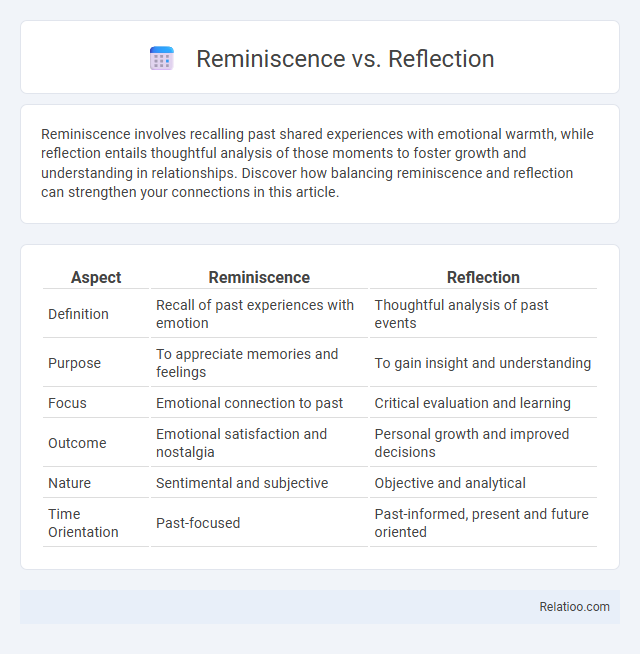Reminiscence involves recalling past shared experiences with emotional warmth, while reflection entails thoughtful analysis of those moments to foster growth and understanding in relationships. Discover how balancing reminiscence and reflection can strengthen your connections in this article.
Table of Comparison
| Aspect | Reminiscence | Reflection |
|---|---|---|
| Definition | Recall of past experiences with emotion | Thoughtful analysis of past events |
| Purpose | To appreciate memories and feelings | To gain insight and understanding |
| Focus | Emotional connection to past | Critical evaluation and learning |
| Outcome | Emotional satisfaction and nostalgia | Personal growth and improved decisions |
| Nature | Sentimental and subjective | Objective and analytical |
| Time Orientation | Past-focused | Past-informed, present and future oriented |
Introduction to Reminiscence and Reflection
Reminiscence involves recalling past experiences with emotional and sensory detail, often triggered by specific memories or stimuli, while reflection is a more deliberate and analytical process of thinking about past events to gain insight or understanding. Your ability to engage in reminiscence enhances emotional well-being by reconnecting with meaningful moments, whereas reflection fosters personal growth through critical evaluation. Both cognitive processes serve distinct roles in how you process and learn from your life history.
Defining Reminiscence: Meaning and Purpose
Reminiscence involves the act of recalling past experiences to derive emotional comfort or preserve personal identity, often triggered by sensory stimuli. Reflection goes deeper, enabling critical analysis and learning from past events to influence future behavior. Your understanding of reminiscence helps distinguish it from reflection and rumination, emphasizing its positive role in memory and well-being.
Understanding Reflection: Key Concepts
Reflection involves a deliberate process of examining experiences, thoughts, and feelings to gain deeper insight and foster personal growth, distinguishing it from reminiscence, which primarily focuses on recalling past events. Understanding reflection includes recognizing its active nature, critical thinking elements, and its role in learning and self-awareness. Key concepts encompass metacognition, emotional processing, and purposeful analysis that transform memories into meaningful lessons.
Psychological Benefits of Reminiscence
Reminiscence involves recalling past experiences to enhance emotional well-being and strengthen identity, promoting psychological benefits such as improved mood and reduced stress. Reflection, by contrast, entails analyzing past events for personal growth and decision-making, fostering insight and self-awareness. You can leverage reminiscence to boost mental health by reconnecting with positive memories, reinforcing a sense of continuity and self-worth.
The Role of Reflection in Personal Growth
Reflection plays a crucial role in personal growth by enabling individuals to analyze their experiences, learn from mistakes, and make informed decisions for future actions. Unlike reminiscence, which involves recalling past events often with nostalgia, reflection requires critical thinking and self-awareness to foster meaningful change. This introspective process helps transform memories into valuable lessons, promoting emotional intelligence and continuous development.
Comparing Reminiscence and Reflection
Reminiscence involves recalling past experiences often with a sentimental or emotional tone, while reflection entails deeper, analytical thinking about those experiences to derive meaning or insights. Your engagement in reminiscence may evoke nostalgia, whereas reflection encourages critical evaluation and personal growth. Both processes are essential for memory processing, but reflection drives learning and self-improvement more effectively than mere reminiscence.
Practical Applications in Daily Life
Reminiscence involves recalling past experiences to foster emotional connection and strengthen personal identity, often used in therapy for memory enhancement. Reflection emphasizes critical thinking and self-assessment, helping individuals analyze decisions and improve future behavior in professional and personal contexts. Both practices support mental well-being, with reminiscence enhancing emotional health and reflection promoting cognitive growth and problem-solving skills.
Reminiscence and Reflection in Therapy
Reminiscence in therapy involves recalling past experiences to improve cognitive function and emotional well-being, often benefiting older adults with memory impairments. Reflection focuses on thoughtful examination of those memories to gain insight, promote self-awareness, and support personal growth during therapeutic sessions. Understanding the distinction helps tailor therapeutic approaches to enhance Your mental health through meaningful engagement with past experiences.
Challenges and Limitations
Reminiscence often faces challenges related to memory accuracy and emotional biases, which can distort past experiences. Reflection requires critical thinking but may be limited by one's self-awareness and cognitive biases, reducing its effectiveness in learning from experiences. Both processes can be constrained by time, context, and individual psychological states, impacting the depth and reliability of insights gained.
Choosing the Right Approach for Self-Discovery
Choosing the right approach for self-discovery involves understanding the subtle differences between reminiscence, reflection, and rumination. Reminiscence focuses on recalling past experiences with a positive or neutral perspective, often enhancing emotional well-being, while reflection entails a deliberate analysis of events to gain insight and foster personal growth. Rumination, characterized by repetitive and negative thought patterns, can hinder self-discovery by fostering anxiety and stagnation, making mindful reflection the most effective method for meaningful introspection.

Infographic: Reminiscence vs Reflection
 relatioo.com
relatioo.com